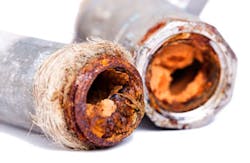Things to know about inhibited glycol-based heat-transfer fluids
Heat-transfer fluids can affect heating and cooling applications. It’s often the case that manufactured goods store at a "correct" temperature, one that maintains quality and life span and complies with health & safety regulation. In food & drink, refrigeration ensures quality and safety. Pharmaceuticals have their own environmental considerations. Labs, production areas and storage space are kept "at temperature."
If you’re already well aware of the vagaries and costs involved in keeping spaces at temperature, it may further interest you to know something about the impact of heat-transfer fluids involved and the benefits of inhibited glycols. In fact, more attention should be paid to the composition and quality of the heat-transfer fluids used in cooling or heating, ventilation and air conditioning (HVAC) applications.
In heat applications, fluids are often used within heat source pumps to harness and transfer heat found in the air or the ground or gathered in solar thermal panels. For cooling, fluids remove heat, whether this is to chill a food or drink, or to cool the plant environment.
Use of efficient heat-transfer fluids should be a priority for suppliers and installers. A key consideration, often overlooked, is the corrosion impact the choice of heat-transfer fluids can have.
Inhibiting corrosion
Given plants in operation 24 hours a day, a poorly maintained heating or cooling system detrimentally impacts production and profitability. Hence, there is a need to evaluate a heat-transfer fluid and its operational impact.
If sourced or used incorrectly, heat-transfer fluids are the most expensive aspect of a cooling or heating system, despite low initial cost. System life span depends on heat-transfer fluid quality, while abiding by a rigorous maintenance regime.
Glycol-based heat-transfer fluids are not particularly corrosive in concentrate form. However, when diluted with water to achieve the required frost protection, corrosion can be a problem for the installer and ultimately the end user. Bacterial growth and scaling within the system can also become an issue as a result of hard and/or inferior water.
It is easy to assume that one glycol-based fluid is the same as the next, but it is important to choose a heat-transfer fluid that has advanced glycol inhibitors to prevent corrosion, scale and other harmful fouling within a system. Moreover, mixing a high-quality product with poor-quality water makes little sense.
Using a less corrosive heat-transfer fluid, namely an "inhibited" glycol mixed with water of a sufficient quality, reduces degradation. Corrosion can lead to leakage and in equipment repair or replacement. System suppliers and installers face risk if installed fluids fall short. An efficient inhibited heat-transfer fluid leads to peace of mind. In project planning, evaluate both initial installation and on-going maintenance and repair costs.
Standards
An international standard, known as the ASTM D 1384 corrosion test standard, plays an increasingly important role as industry seeks to reduce system corrosion. The standard is applied to metals commonly used in heating or cooling, including aluminum, iron, steel, brass, solder and copper — under controlled laboratory conditions.
Metals are immersed in an inhibited glycol/water mixture aerated to simulate in-situ conditions at 88 degrees C. Metal pieces specified at set weights and sizes are weighed before testing begins. The test is carried out over a period of four weeks.
Following the procedure, the metal pieces are weighed again. Before and after weight measurements are compared for signs of corrosion. To pass the test, mass change in the metals before and after the test must not exceed the standard’s stipulated levels. The test demonstrates that the fluid protects sufficiently against corrosion. Any fluid can be said to contain corrosion inhibitors, but without a test standard, the extent of protection is difficult to gauge.
Use of the standard remains voluntary, but heat-transfer fluids meeting its requirements increase customer peace of mind. While heat-transfer fluid quality is paramount, maintenance regimes keep systems running. During service, check fluid pressures periodically and for the presence of any foreign bodies indicative of fluid breakdown.
How fluids are transferred, stored, heated and applied impacts performance. Regular quality checks should be performed. Combine maintenance checks with an examination of system glycol content, to maintain sufficient frost protection. For long-term maintenance, system cleaning should be done regularly, with correct amounts of glycol concentrated with good quality water.
Looking to the future
In summary, careful selection of heat-transfer fluids reduces maintenance and repair needs. This approach will extend the life of equipment and ultimately maximize the investment that has been made.
Nobody purchases a high-end luxury sports car and then fills it with poor quality fuel. The same holds true for heating and cooling, where the impact of poor quality heat transfer fluids should never be underestimated.
Andrew Murray is senior Manager at Kilfrost’s Speciality Fluids Division.
Since the 1930s, Kilfrost has been a leader in de/anti-icing products. In 2012, Kilfrost launched its Specialty Fluids Division, which produces heat transfer and industrial fluids.
